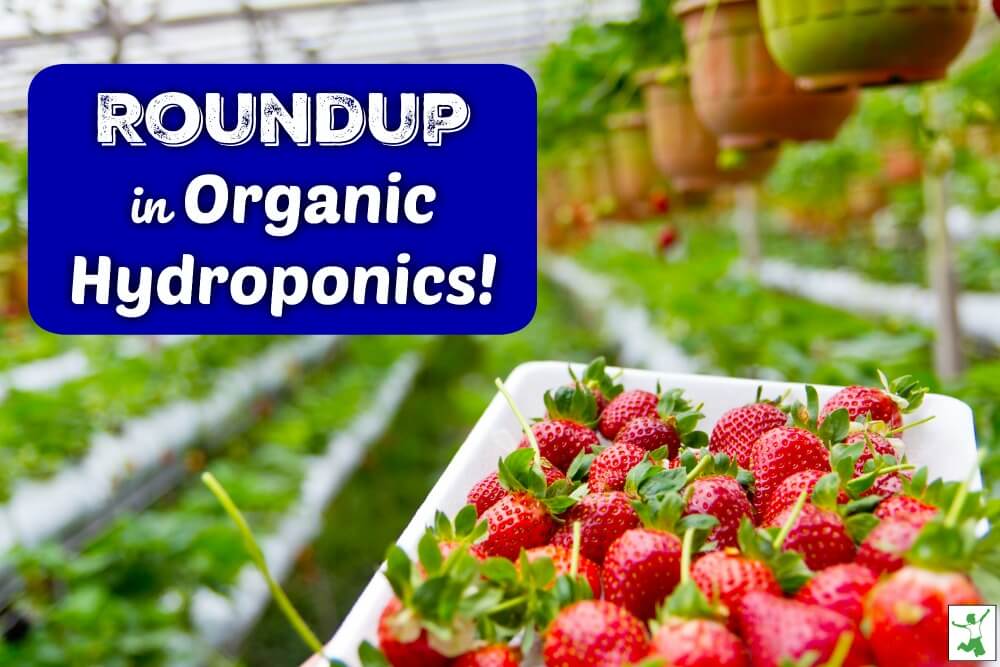Table of Contents[Hide][Show]
 I’ve made no secret of my disdain for organic hydroponic produce over the years. Unfortunately, this stuff now constitutes the bulk of fruits and vegetables sold at big-box health food retailers like Earth Fare and Whole Foods.
I’ve made no secret of my disdain for organic hydroponic produce over the years. Unfortunately, this stuff now constitutes the bulk of fruits and vegetables sold at big-box health food retailers like Earth Fare and Whole Foods.
If I see anything with the name Driscoll’s or Wholesum Harvest on it (the biggies in organic hydroponics), I won’t buy it.
Not only is hydroponics less tasty and nutritious than even non-organic local produce grown in well-tended soil, but it tends to rot extremely fast too.
Ever wondered why that expensive box of organic strawberries gets furry with mold within days of purchase?
Yes, that’s why.
It was hydroponically grown.
In short, organic hydroponics is, by and large, an incredible waste of your hard-earned food dollars.
The best organic produce is locally grown even if it isn’t officially certified. These locally grown fruits and vegetables are sold at farmer’s markets or independent natural food stores.
Those of you who have been eating organic for several decades like me know exactly what I’m talking about here!
Glyphosate and USDA Organic
Now comes the news that these massive “organic” hydroponic operations are using glyphosate-containing herbicides like Roundup.
Worse, this is happening with the blessing of the National Organics Program run by the USDA.
This is a huge concern especially given the $2 billion award against Bayer/Monsanto for its cancer-causing glyphosate-based herbicides. Over 13,000 pending lawsuits remain on the docket.
So, here’s the deal.
When a soil-based farm wants to get organically certified, there is a transition period of three years. This means that the farmers must grow their crops 100% clean using no chemical pesticides, herbicides, or fungicides for 36 months before those crops earn the USDA Organic label.
Guess what the transition period is for a hydroponic operation?
ZERO!
This means that a hydroponic producer can use ANY chemical on their land or greenhouse that is allowed in conventional agriculture in any quantity at any time.
All they have to do to get IMMEDIATELY certified organic (or get re-certified if they went on an offseason Roundup spraying spree) is simply bring in new substrate (the non-soil material used in the pots). (1)
What a scam!
What is Substrate?
Let’s drill down into what exactly hydroponic substrate is.
According to the Real Organic Project:
Substrate is the fancy word for the growing medium in the pot. Hydroponic producers choose materials to grow in like shredded coconut husks (called coir) because they don’t rot.
They also don’t provide any nutrition to the plants. [emphasis mine]
The coir holds the roots and the water. All the nutrition is provided as a near-constant liquid feed in the irrigation water. Hydroponics can happen in a container on the ground or on a table. For some crops, it even happens without any container at all. At its most extreme form, called aeroponics, the roots are suspended in the air and sprayed with the nutrient solution.
There is no nutritional difference between spraying the roots in the air or watering them in a container of coir or a bucket of water. The difference is in the time the plant can survive if the electricity goes off. With an “aeroponic” system, it is a matter of minutes. With a container system, it is a matter of hours. It is the same nutrition.
You Need to Know HOW Your Organic Produce is Grown
The bottom line is that USDA Organic certification is not enough to ensure the avoidance of dangerous chemicals like Roundup with its immune system destroying glyphosate residue.
You must take the time to familiarize yourself with the farms that grow your produce.
Do they grow in nutritionless coco coir pots with chemical spraying allowed only a few days prior? If so, find another farm that does it right in soil free from any pesticide/herbicide/fungicide spraying for a minimum of three years.
Jenny Prince of The Real Organic Project, sums it up well:
In the new USDA interpretation, “certified organic” no longer defines how the land is farmed. It now only defines how a pot of coco coir is “farmed.” (2)
The USDA definition of organic flies in the face of what other nations are doing. Just recently, the United Arab Emirates agreed with all other nations except the United States in banning hydroponics for organic certification.
Ultimately, hydroponics and organics are mutually exclusive terms. If you have one, you can’t have the other.
References
(1, 2) The Real Organic Project








Leave a Reply